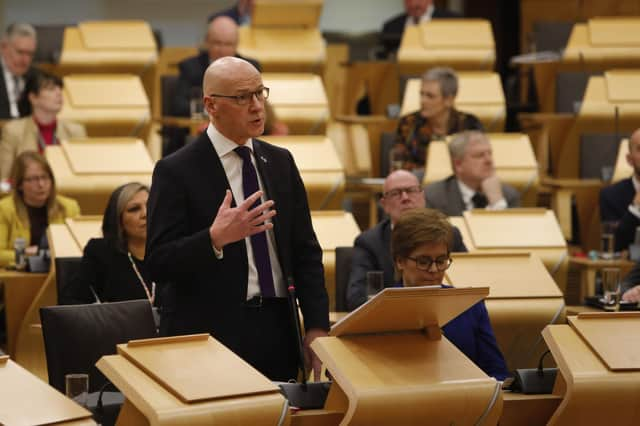Scottish Budget: John Swinney's sleight of hand can’t hide damage he’s doing to economy – Murdo Fraser


Yet our stand-in Finance Secretary John Swinney, in these tough times of tightening belts, thinks we are not taxed enough. He has raised taxes again, embedding Scotland’s place as the highest taxed part of the UK.
The SNP say this is a sign they ‘care’ about public services. I think it proves the opposite. That they do not care about Scotland’s resources. They squander the money you and I earn and care not at all about growing our economy which would be the best way of increasing resources for public services.
Advertisement
Hide AdAdvertisement
Hide AdFor all the rhetoric about raising taxes to give an additional £1 billion to the NHS, the reality is that the tax changes announced in Swinney’s budget will produce only an extra £129 million throughout the coming year – not even enough to fund the NHS for three days.
The great majority of additional funding to support health and social care here will come in the form of the block grant from Westminster, which is at record high levels. But pointing out this simple fact would ruin the SNP’s narrative about the benefits of so-called “progressive taxation”.
Furthermore, the claim that the Scottish Budget is “fixed” is, at best, dishonest. Since the advent of fiscal devolution, the overall size of the Scottish Budget is tied directly to the relative tax performance of Scotland compared to the rest of the UK. Deliver faster economic growth and a higher tax take in Scotland, and we will have more money to spend on public services, and the reverse is equally true.
Sadly, under this SNP government, slower growth and lower revenues have been delivered, and the consequence is that there is less money to spend. We already know that since 2014 the Scottish economy has grown at roughly half the rate of the UK on average. This translates to lower tax revenues, meaning that the tax changes put through by the SNP prior to the most recent budget have actually raised less money than would have been the case had taxes continued to be set at Westminster.
As Elon Musk might say, let that sink in. The SNP demanded the powers to tax us more and the result is less to spend on public services. But Scots, and our hospitals and schools, are out of pocket thanks to the change.
The Scottish Fiscal Commission predicts that our economic growth will lag behind the rest of the UK in every year from 2024-2027. From 2022-2027, Scottish GDP is predicted to grow by just 10.4 per cent, compared to 12.1 per cent for the rest of the UK. This leaves a gap of £2.8 billion in GDP compared to the rest of the UK, equivalent to nearly £1,000 for every taxpayer in Scotland.
Deprioritising economic growth and instead pursuing a policy of higher taxes comes at substantial cost in the long run. We will find ourselves trapped in a vicious circle of slow-growing tax revenues, increasing tax rates, and sluggish economic growth.
Nor was there any need for these tax rises. As my Scottish Conservative colleague Liz Smith pointed out in her response to the budget, there were plenty of other options available to Swinney to find the extra £129 million.
Advertisement
Hide AdAdvertisement
Hide AdThe vanity project that is the SNP’s National Care Service, a bureaucratic monstrosity that will take power away from local communities, should have been scrapped. The wastage that we have seen on projects such as supporting BiFab, Prestwick Airport, the malicious prosecution of the Rangers FC administrators, and the unbuilt ferries at Ferguson Marine, could have paid for these tax rises many times over.
Instead, the SNP government puts its hand further into the pockets of those who are already paying too much in tax, meaning that incentives to work harder and expand the economy will be reduced. It all sends out a message that Scotland is not an attractive place to live, work or do business, and in the long run this damages our prospects for economic recovery.
But perhaps the worst aspect of Swinney’s budget was just how deceitful it was. Throughout his presentation to the Parliament, he tried to blame Scotland’s poor economic performance on decisions taken by the Westminster government, ignoring the fact that all western economies are facing the same headwinds, and that the inflation rate in the UK in October was actually lower than the EU average in the same period.
He also claimed that he was giving a fair settlement to local government, with an extra £500 million. The truth became apparent in the analysis by the Institute for Fiscal Studies, which showed that council funding would actually fall in real terms by five per cent over the next year.
There was no surprise that this led to a furious reaction from council leaders at Cosla, who unanimously passed a motion expressing extreme disappointment at the budget settlement, warning of socially harmful cuts to vital local services and the loss of jobs within local authorities and related businesses.
It would have been better, in my view, had Swinney been honest with the Scottish Parliament about the choices he had made, rather than trying through sleight of hand to suggest that cuts were not being made. As it stands, relations between the Scottish Government and local councils will be difficult to repair given the way that the budget has been presented.
Hiking taxes higher and higher on a shrinking pool of higher earners may tick a box marked “progressive taxation”, but it will do nothing for Scotland’s economic viability in the longer run, nor our ability to fund sustainable public services.
Murdo Fraser is a Scottish Conservative MSP for Mid-Scotland and Fife
Comments
Want to join the conversation? Please or to comment on this article.